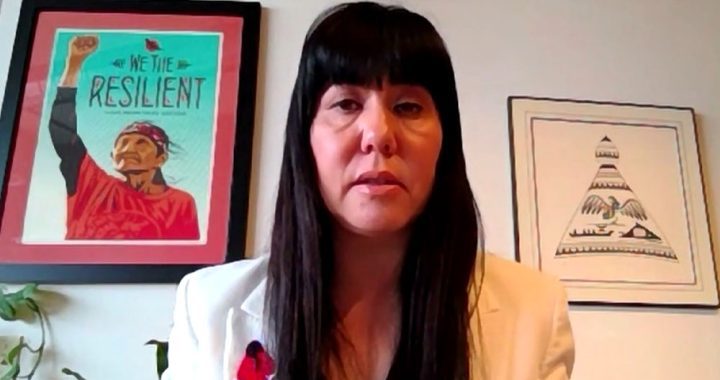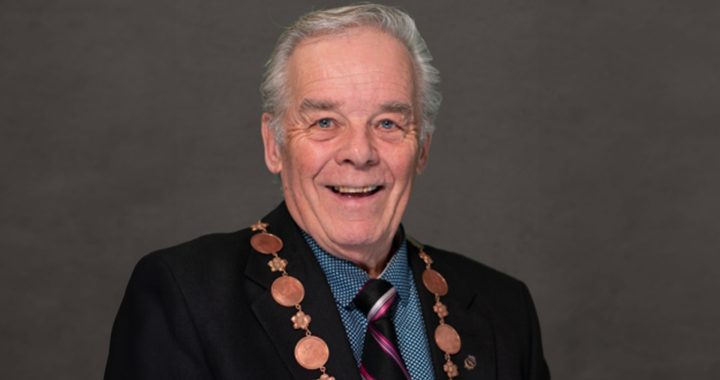A First Nations woman who is challenging Yukon’s Safer Communities and Neighbourhoods law, also known as SCAN, in the territory’s Supreme Court is now waiting for a decision on whether it violated her charter rights.
The lawyer for Celia Wright, a member of the Ta’an Kwäch’än Council, argued before Chief Justice Suzanne Duncan that the SCAN law, which allowed her to be evicted in a little as five days, infringed her right to life, liberty and security.
According to Wright, she and her now-husband, along with her eight children and mother-in-law, were served an eviction notice by SCAN officers in December 2020 after an anonymous complaint was made.
The notice gave five days to vacate the property.
The territory’s SCAN unit operates under the Department of Justice with the goal of “shutting down” property where criminal activity like drug trafficking, organized crime and bootlegging is taking place.
Under the law, tenants can be evicted from rental properties regardless of the contract they signed.
In November of 2022, Wright and her partner were charged with drug, weapon and stolen property-related offences after their rental property in Whitehorse was raided by the RCMP.
Those charges have not yet been tested in court.
Wright said she was able to obtain a court-ordered extension until the end of January 2021. That same month, SCAN rescinded its notice after the family’s landlord gave an eviction notice of his own.
Despite SCAN rescinding its notice, Wright proceeded with a legal challenge of the SCAN law.
Her lawyer, Vincent Larochelle, told APTN News his client is fighting back against legislation she feels is unconstitutional and unfairly targets Indigenous people.
“She knows what this law can do to wreck havoc in the lives of her (Indigenous) brothers and sisters. She wanted it to stop. That’s why we’re here,” he said.
Petition background
Wright testified in court that prior to the raid, she and her family were living peacefully at the property where they had an infrequent but friendly relationship with their landlord.
At the time, she said plans were in the works for the family to purchase the house from the landlord.
After the SCAN eviction notice was issued, Wright testified her landlord told her partner he was being “bullied” by SCAN officials to evict the family.
“(He said) if he didn’t agree with (the eviction) they would go ahead without him and have his house seized. It would be property that he would no longer own,” she testified in court.
Wright spoke at length about the challenges of finding suitable accommodations for a family of her size, describing it as an immensely stressful experience.
With few options available, the family ended up temporarily living in an RV with no heat and running water.
Wright became emotional while describing the stress of situation and how the father of some of her children took custody of them due to their unstable living conditions.
“That was really difficult,” she said. “I’m Indigenous to this land and I was homeless. I didn’t even have a parcel of land to pitch a tent on.”
Wright also touched on the fact her mother-in-law, who struggles with mental illness, was forced to live in a tent after the eviction at a campground.
“I thought that was kind of messed up. She didn’t even do anything and she was kicked out,” she said.
With the help of Wright’s First Nation, the family was able to find housing and is now living in a three-bedroom house while continuing to look for more suitable accommodations.
Former SCAN investigator testifies
However, Wright’s testimony appeared to contradict the SCAN investigator who served her the eviction notice.
Kurt Bringsli, who no longer works for the unit, testified while it was SCAN’s decision to investigate the complaint against Wright and her partner, it was their landlord who ultimately chose to evict to them.
Bringsli explained in order for an eviction to take place under the law, landlords must give their consent to do so.
He detailed how Wright’s landlord was concerned about his safety and property and agreed to work with SCAN to have the family evicted.
Bringsli also noted since Wright’s eviction, SCAN now typically provides 14 days notice, though that time frame can change depending on the circumstances.
Under cross-examination, Lacrochelle asked if the SCAN unit checked in with the family after serving them the eviction notice or offered to help find supports, Bringsli said it wasn’t necessary as an extension was granted and the landlord had issued his own eviction.
Experts weigh in
Academics and experts likewise provided their knowledge of homelessness and complaints-based nuisance property ordinances.
Carmela Murdocca, a sociology professor at York University, told the court how settler-colonialism continues to impact Indigenous people today.
She said a common feature of colonialism is dispossession and eviction of Indigenous peoples from the land.
“Eviction can be understood as a kind of anti-Indigenous racism,” she said.
She also said complaints-based nuisance property ordinances like SCAN often invites community members to police and surveillance the neighborhood, a term she referred to as “soft policing.”
The Crown prosecutor noted Murdocca’s research is not exclusively tied to the Yukon’s SCAN act.
SCAN harms Indigenous people, lawyer argues
During closing arguments on Nov. 10, Larochelle argued evicting drug dealers out of their homes does little to address the problem.
Using experts’ testimony, he described how homelessness can have serious consequences leading to issues like illness and disease, substance use and death, which is a violation of a person’s right to life.
Larochelle also argued the section of Yukon’s SCAN legislation dealing with the five-day eviction notices gives SCAN’s director “capricious power.” He said that’s because the only evidence needed to evict is a complaint and landlords’ consent.
He further noted that a lack of data regarding Yukon’s SCAN legislation is discriminatory in itself as it prevents Indigenous organizations from collecting information needed to make systemic changes.
“The failure of the SCAN Unit, in these circumstances that are known or should be known to them to collect race-based data, is an egregious thing,” he said.
He added that while the lack of data meant he couldn’t backup his claims outright, evidence from experts shows it would be reasonable to conclude SCAN disproportionally harms Indigenous people.

Fraser Harland, lawyer for the Canadian Civil Liberties Association, which is an intervenor in the case, said Yukon government “deputizes” landlords to carry out eviction to prevent SCAN’s director from having to go to court to obtain “onerous” community safety orders.
Community safety orders can require tenets to meet a number of conditions or allow for the property to be closed for up to 90 days.
Harland also said Yukon’s SCAN legislation is broader than necessary in order for it to “carry out its objectives.”
He cited the fact prostitution is listed as criminal activity under the SCAN Act, though it’s not illegal to sell sex in Canada.
Crown insists SCAN be used as ‘tool’
Meanwhile, the Crown focused on disputing much of Larochelle’s arguments.
Lawyer Kelly McGill said only 25 SCAN evictions took place over a span of five years and that no evictions have occurred with five-day notice since Wright’s eviction.
McGill argued Wright’s right to life and liberty was likewise never threatened because SCAN in itself doesn’t impose death.
She cited a case in another jurisdiction where a homeless encampment was torn down by city officials. She said those impacted didn’t have the ability to shelter themselves and there was no space available at a shelter to take them in, putting their life and liberty at threat.
She explained unlike those in the encampment, Wright was not previously living on the streets and shelter space was available for her and her family.
McGill added Wright didn’t have a right to a particular property just because she felt it was well suited for her family’s needs, nor did her personal liberty override that of her landlord, who also has a right to enjoy his own property.
McGill also asserted SCAN can be used as a “tool” for landlords to address tenancy issues.
She said in some cases landlords are scared to serve evictions notices or go to the Residential Landlord and Tenant Act tribunals. SCAN, she said, puts the onus of eviction on the unit’s director while reliving the burden on the landlord.
“SCAN is an efficient and safe way to take back property,” she said.
SCAN review underway
Larochelle told APTN that while SCAN’s goal to make communities and neighborhoods safer was done with good intent, the legislation behind it is unconstitutional.
“Do I think that the government law here, the law that allows evictions on five days notice without any notice to the tenant prior to that is constitutional? No,” he said.
Duncan reserved her decision. Larochelle said it will be several months before a decision is reached.
Government spokesperson Jasmine Doll said in an email to APTN a preliminary review of SCAN is underway.
The review will seek input from Yukon First Nation Governments, communities, the public and other stakeholders. It will also include a review of legislation in other jurisdictions and the relevant case law.
It’s expected to be completed in 2027.









